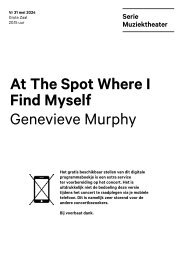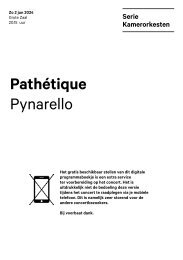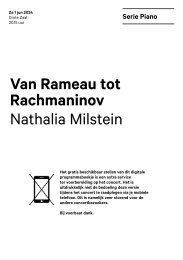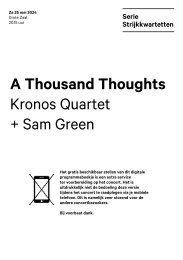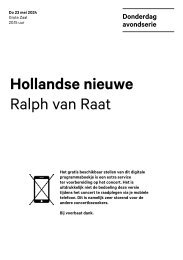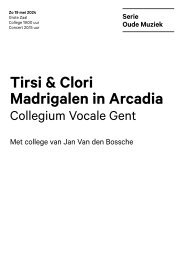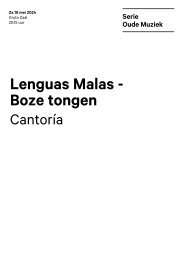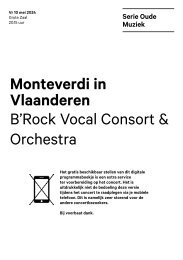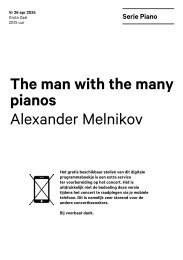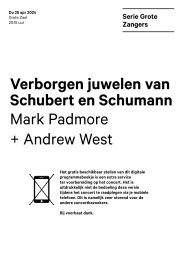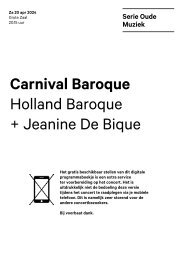You also want an ePaper? Increase the reach of your titles
YUMPU automatically turns print PDFs into web optimized ePapers that Google loves.
Biographies<br />
Composers<br />
Since the 19th-century Bach<br />
revival Johann Sebastian<br />
Bach (1685 - 1750) has<br />
been generally regarded<br />
as one of the greatest<br />
composers in the history<br />
of Western music. Like no<br />
other composer before him,<br />
Bach knew how to combine<br />
simplicity and complexity,<br />
emotion and musical<br />
architecture, spiritual<br />
content and thoughtful<br />
form. As a composer, he was<br />
not only groundbreaking<br />
but also extremely prolific,<br />
given that he gave over 250<br />
cantatas to his name. He was<br />
also a gifted harpsichordist<br />
and organist.<br />
Ludwig van Beethoven<br />
(1770 - 1827) was taught by<br />
court organist and composer<br />
Christian Gottlob Neefe,<br />
who introduced him to the<br />
ideas of C.Ph.E. Bach and to<br />
the humanistic worldview of<br />
the Freemasons. In Vienna,<br />
he initially became famous<br />
mainly as a piano virtuoso<br />
and improviser. In 1815 his<br />
damaged hearing forced<br />
him to quit as a performing<br />
pianist. Beethoven’s hearing<br />
40<br />
loss did not prevent him<br />
from composing music. The<br />
depth he achieved in his late<br />
compositions are a miracle<br />
of human strength and<br />
concentration.<br />
Johannes Brahms (1833 -<br />
1897) wrote his first<br />
compositions at the age of<br />
eighteen. During a concert<br />
tour with Hungarian violinist<br />
Eduard Reményi, Brahms<br />
met Franz Liszt and Robert<br />
Schumann. Schumann,<br />
greatly impressed and<br />
delighted by the 20-yearold’s<br />
talent, published an<br />
article which led to the first<br />
publication of Brahms’s<br />
works under his own name.<br />
Brahms feeled deeply<br />
for Clara Schumann and<br />
their intensely emotional<br />
platonic relationship lasted<br />
until Clara’s death. In 1862,<br />
Brahms settled in Vienna,<br />
where he gave many<br />
concerts and made concert<br />
tours. After 1881, Brahms<br />
engaged more and more<br />
intensively in composing.<br />
The Czech composer Leoš<br />
Janáček (1854 - 1928)<br />
devoted himself mainly to<br />
folkloristic research and he<br />
earned a living as a music<br />
teacher, and conducted<br />
various amateur choirs<br />
in Brno. In 1881, Janáček<br />
founded and was appointed<br />
director of the organ school,<br />
and held this post until 1919,<br />
when the school became the<br />
Brno Conservatory. He led<br />
the mainstream of folklorist<br />
activity in Moravia and<br />
Silesia, using a repertoire<br />
of folk songs and dances<br />
in orchestral and piano<br />
arrangements. After the<br />
success of his opera Jenůfa,<br />
Janáček became one of his<br />
country’s most important<br />
composers.<br />
Modest Mussorgsky<br />
(1839 - 1881) was the son of<br />
a Russian large landowning<br />
family and was trained<br />
as an army officer, but<br />
the call of music proved<br />
stronger. At soirees by<br />
Alexander Dargomyzhsky,<br />
he met the composers<br />
of the ‘Mighty Handful’<br />
and was initiated into the<br />
secrets of composition by<br />
Mili Balakirev and others.<br />
Mussorgsky championed<br />
genuine Russian music<br />
and often deviated in his<br />
harmonies and melodies<br />
from what was common in<br />
Russia at the time.






